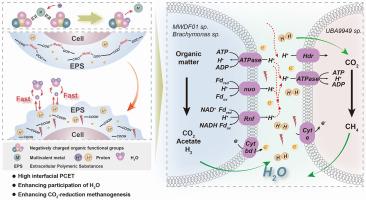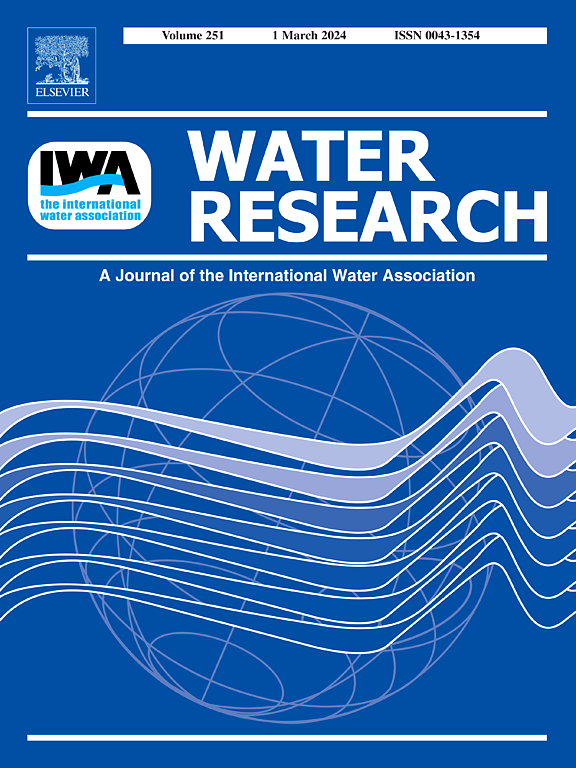提高水对污泥厌氧消化的参与,实现高效产甲烷
IF 12.4
1区 环境科学与生态学
Q1 ENGINEERING, ENVIRONMENTAL
引用次数: 0
摘要
水广泛存在于污水污泥中,所占比例最大;然而,其在污泥产甲烷中的作用一直被忽视。本文揭示了提高水参与污泥产甲烷的机制。通过稳定同位素示踪实验,我们发现等电点预处理显著增强了水对co2还原产甲烷的参与。实验结果表明,污泥中固液非共价相互作用和界面水有序性显著增强。前者的结果驱动电子转移,而后者提供了一个有效的质子通道。结合氢/氘动力学同位素效应(KIE)测试,表明污泥中水介导的质子耦合电子转移(PCET)增强,并可能伴有量子隧道效应(KIE >>;10)。关键酶浓度的变化表明,增强水介导的PCET促进了细胞内和细胞外的电子-质子流动,加快了NADH和NAD+之间的相互转化效率,强烈地驱动了ATP的合成。进一步以基因组为中心的宏基因组分析和反应热力学计算表明,水介导的PCET增强引发了co2还原产甲烷联合体的富集,并有效地绕过了H2分压的限制,为促进协同产甲烷代谢提供了热力学优势。这些研究结果为水调控易腐有机固体废物产甲烷提供了理论依据。本文章由计算机程序翻译,如有差异,请以英文原文为准。

Enhancing the participation of water in the anaerobic digestion of sewage sludge for highly efficient methanogenesis
Water is widely present in sewage sludge, in which it constitutes the largest proportion; however, its participation in the methanogenesis of sludge has been overlooked. Here we revealed the mechanisms enhancing the participation of water in methanogenesis of sludge. Through stable isotope tracing experiments, we observed that isoelectric point pretreatment significantly enhanced the participation of water in CO2-reduction methanogenesis. Experimental results show that solid-liquid non-covalent interactions and interfacial water ordering in sludge were significantly enhanced. The former outcome drove electron transfer, while the latter provided an efficient proton channel. Combined with hydrogen/deuterium kinetic isotope effect (KIE) tests, it demonstrated that the water-mediated proton-coupled electron transfer (PCET) in the sludge were enhanced, accompanied by possible quantum tunnelling effect (KIE >> 10). Variations in the concentrations of key enzymes indicated that enhancing water-mediated PCET promoted both intracellular and extracellular electron–proton flow and accelerated the efficiency of mutual conversion between NADH and NAD+, strongly driving ATP synthesis. Further genome-centric metagenomic analysis and reaction thermodynamic calculations revealed that enhancing water-mediated PCET triggered enrichment of CO2-reduction methanogenic consortia and effectively bypassed the limitation of H2 partial pressure, providing a thermodynamic advantage to promote collaborative methanogenic metabolisms. These findings provide a theoretical basis for regulating the methanogenesis of perishable organic solid waste by water.
求助全文
通过发布文献求助,成功后即可免费获取论文全文。
去求助
来源期刊

Water Research
环境科学-工程:环境
CiteScore
20.80
自引率
9.40%
发文量
1307
审稿时长
38 days
期刊介绍:
Water Research, along with its open access companion journal Water Research X, serves as a platform for publishing original research papers covering various aspects of the science and technology related to the anthropogenic water cycle, water quality, and its management worldwide. The audience targeted by the journal comprises biologists, chemical engineers, chemists, civil engineers, environmental engineers, limnologists, and microbiologists. The scope of the journal include:
•Treatment processes for water and wastewaters (municipal, agricultural, industrial, and on-site treatment), including resource recovery and residuals management;
•Urban hydrology including sewer systems, stormwater management, and green infrastructure;
•Drinking water treatment and distribution;
•Potable and non-potable water reuse;
•Sanitation, public health, and risk assessment;
•Anaerobic digestion, solid and hazardous waste management, including source characterization and the effects and control of leachates and gaseous emissions;
•Contaminants (chemical, microbial, anthropogenic particles such as nanoparticles or microplastics) and related water quality sensing, monitoring, fate, and assessment;
•Anthropogenic impacts on inland, tidal, coastal and urban waters, focusing on surface and ground waters, and point and non-point sources of pollution;
•Environmental restoration, linked to surface water, groundwater and groundwater remediation;
•Analysis of the interfaces between sediments and water, and between water and atmosphere, focusing specifically on anthropogenic impacts;
•Mathematical modelling, systems analysis, machine learning, and beneficial use of big data related to the anthropogenic water cycle;
•Socio-economic, policy, and regulations studies.
 求助内容:
求助内容: 应助结果提醒方式:
应助结果提醒方式:


